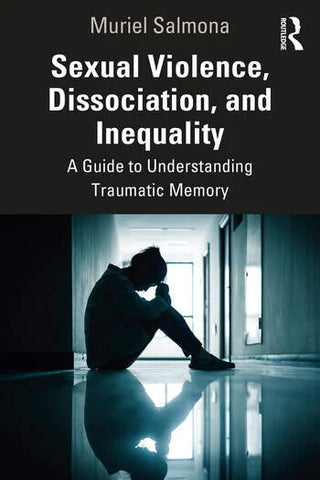Sexual Violence, Dissociation, and Inequality : A Guide to Understanding Traumatic Memory
- Unit price
- / per
-
Author:SALMONA Muriel
-
ISBN:9781032802619
-
Publication Date:November 2024
-
Edition:1
-
Pages:298
-
Binding:Paperback
-
Publisher:Routledge
-
Country of Publication:United Kingdom


A Back Order button means that we don’t have the book in stock at our store. It may already be on order – or we can order it for you from a publisher or distributor at no additional cost.
As we source items from around the globe, a back-order can take anywhere from 5 days to several weeks to arrive, depending on the title.
To check how long this might take, you’re welcome to contact us and we can provide an ETA or any other information you need. We recommend checking the timeframe before committing to an online order.
Sexual Violence, Dissociation, and Inequality : A Guide to Understanding Traumatic Memory
- Unit price
- / per
-
Author:SALMONA Muriel
-
ISBN:9781032802619
-
Publication Date:November 2024
-
Edition:1
-
Pages:298
-
Binding:Paperback
-
Publisher:Routledge
-
Country of Publication:United Kingdom
Description
Sexual Violence, Dissociation, and Inequality is a book about traumatic memory—or how lived trauma is repeated by victims as if happening again.
The author, internationally renowned psychiatrist Muriel Salmona, lays out a convincing argument for the ways in which victims are neurologically compelled to relive trauma and how, with proper treatment, they can fully heal. Informed by decades of clinical practice, research, and activism, Salmona explains how victims’ behaviours are rooted in neurology as normal responses to abnormal situations. In contrast to a climate of victim-blaming denial, Salmona explains how grave the violation of victims’ human rights truly is and what to do about it in terms of care and prevention. She explains in clear language how to reconstruct victims’ narratives, which are often clouded by traumatic amnesia, and thereby reconnect parts of the brain that were severed during the traumatic event.
This is a guide for professionals who work with survivors, for survivors themselves, and for anyone committed to understanding and reducing violence and inequality.
Adding product to your cart
You may also like
A Back Order button means that we don’t have the book in stock at our store. It may already be on order – or we can order it for you from a publisher or distributor at no additional cost.
As we source items from around the globe, a back-order can take anywhere from 5 days to several weeks to arrive, depending on the title.
To check how long this might take, you’re welcome to contact us and we can provide an ETA or any other information you need. We recommend checking the timeframe before committing to an online order.
You may also like
You may also like
-
Sexual Violence, Dissociation, and Inequality is a book about traumatic memory—or how lived trauma is repeated by victims as if happening again.
The author, internationally renowned psychiatrist Muriel Salmona, lays out a convincing argument for the ways in which victims are neurologically compelled to relive trauma and how, with proper treatment, they can fully heal. Informed by decades of clinical practice, research, and activism, Salmona explains how victims’ behaviours are rooted in neurology as normal responses to abnormal situations. In contrast to a climate of victim-blaming denial, Salmona explains how grave the violation of victims’ human rights truly is and what to do about it in terms of care and prevention. She explains in clear language how to reconstruct victims’ narratives, which are often clouded by traumatic amnesia, and thereby reconnect parts of the brain that were severed during the traumatic event.
This is a guide for professionals who work with survivors, for survivors themselves, and for anyone committed to understanding and reducing violence and inequality.
-
-
Author: SALMONA MurielISBN: 9781032802619Publication Date: November 2024Edition: 1Pages: 298Binding: PaperbackPublisher: RoutledgeCountry of Publication: United Kingdom
Sexual Violence, Dissociation, and Inequality is a book about traumatic memory—or how lived trauma is repeated by victims as if happening again.
The author, internationally renowned psychiatrist Muriel Salmona, lays out a convincing argument for the ways in which victims are neurologically compelled to relive trauma and how, with proper treatment, they can fully heal. Informed by decades of clinical practice, research, and activism, Salmona explains how victims’ behaviours are rooted in neurology as normal responses to abnormal situations. In contrast to a climate of victim-blaming denial, Salmona explains how grave the violation of victims’ human rights truly is and what to do about it in terms of care and prevention. She explains in clear language how to reconstruct victims’ narratives, which are often clouded by traumatic amnesia, and thereby reconnect parts of the brain that were severed during the traumatic event.
This is a guide for professionals who work with survivors, for survivors themselves, and for anyone committed to understanding and reducing violence and inequality.
-
Author: SALMONA MurielISBN: 9781032802619Publication Date: November 2024Edition: 1Pages: 298Binding: PaperbackPublisher: RoutledgeCountry of Publication: United Kingdom
-



